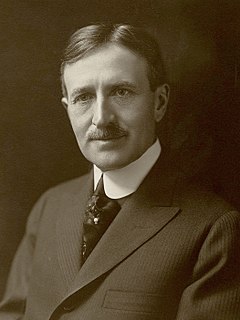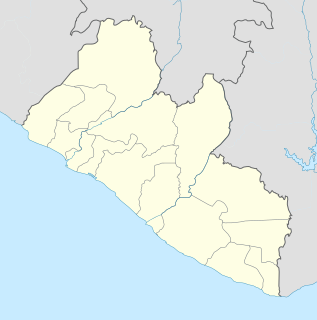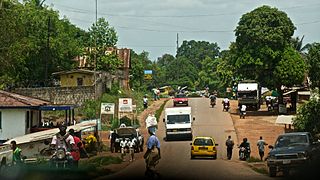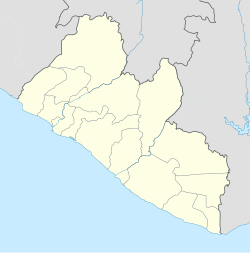The economy of Liberia is extremely underdeveloped, largely due to the First Liberian Civil War from 1989–96. Liberia itself is one of the poorest and least developed countries in the world.

Harvey Samuel Firestone was an American businessman, and the founder of the Firestone Tire and Rubber Company, one of the first global makers of automobile tires.

Monrovia is the capital city of the West African country of Liberia. Located on the Atlantic Coast at Cape Mesurado, Monrovia had a population of 1,010,970 as of the 2008 census. With 29% of the total population of Liberia, Monrovia is the country's most populous city.
Firestone Tire and Rubber Company is an American tire company founded by Harvey Firestone in 1900 initially to supply solid rubber side-wire tires for fire apparatus, and later, pneumatic tires for wagons, buggies, and other forms of wheeled transportation common in the era. Firestone soon saw the huge potential for marketing tires for automobiles, and the company was a pioneer in the mass production of tires. Harvey Firestone had a personal friendship with Henry Ford, and used this to become the original equipment supplier of Ford Motor Company automobiles, and was also active in the replacement market.

Buchanan is the third largest city in Liberia, lying on Waterhouse Bay, part of the Atlantic Ocean. As of the 2008 census, Buchanan has a population of 34,270. Of this, 16,984 were male and 17,286 female.

Bomi is a county in the northwestern portion of the West African nation of Liberia. The county was established in 1984. The county's area is 746 square miles (1,900 km2).

Bensonville is the capital city of Montserrado County, Liberia. As of the 2008 national census, its population stood at 4,089. Bensonville is located 20 miles away from the national capital, Monrovia, which is also located in Montserrado County. It is a commercial center for the surrounding agricultural area.

Kakata, is the capital city of Liberia's Margibi County and is located in Kakata District just over the Du River bridge which is its border with Todee District. It is a transit town at the heart of the historical natural rubber cultivation belt in Liberia. The city is colloquially known as "Kak City". The City host the Office of the National Civil Society Council of Liberia, Margibi Chapter. The Council which is headed by Mr. Friday Edwin Crusor, is known for its diligent role in Advocacy, Dialogue, and Peacebuilding among others.
Allen N. Yancy (1881–1941) was Vice President of Liberia from 1928 to 1930 under President Charles D.B. King. He was forced to resign in 1930 following his involvement with forced labor exported to the Spanish-controlled island of Fernando Po.
The University of Liberia is a publicly funded institution of higher learning located in Monrovia, Liberia. Authorized by the national government in 1851, the University opened in 1862 as Liberia College. UL has four campuses; including the Capitol Hill Campus in Monrovia, Fendell campus in Louisiana, outside Monrovia, the Medical School Campus in Congo Town and the Straz-Sinje Campus located in Sinje Grand Cape Mount County. The University enrolls approximately 18,000 students and is one of the oldest institutions of higher learning in West Africa. It is accredited by the Liberian Commission on Higher Education.
A new civil war began in 1999 when a rebel group backed by the government of neighboring Guinea, the Liberians United for Reconciliation and Democracy (LURD), emerged in northern Liberia. By the spring of 2001, they were posing a major threat to the Taylor government. Liberia was now engaged in a complex three-way conflict with Sierra Leone and the Guinea Republic. By the beginning of 2002, both of these countries were supporting the latest addition to the lexicon of Liberian guerrilla outfits – Liberians United for Reconciliation and Democracy (LURD), while Taylor was supporting various opposition factions in both countries. By supporting Sierra Leonean rebels, Taylor also drew the enmity of the British and Americans.

Liberia – United States relations are bilateral relations between Liberia and the United States.
The Firestone hydroelectric power station is a hydroelectric power station in Liberia on the Farmington River. Built in 1942, it was the first power generating dam built in the country. Located in Harbel, Margibi County, it is operated by the Firestone Plantations Company.

The Saint John River is one of the six main rivers in the West African nation of Liberia. With its headwaters in neighboring Guinea, the river flows generally southwest through Liberia and empties into the Atlantic Ocean at Bassa Cove near Edina in Grand Bassa County. The 175-mile-long (282 km) river has a drainage basin covering 5,700 square miles (15,000 km2).
The Seaview Golf Club is the owner of Liberia's only 18-hole golf course, located opposite the Unity Conference Center and situated on one hundred acres of landscape where the St. Paul River empties into the Atlantic Ocean in Virginia, Montserrado County, Liberia. It is located about 10 kilometers northwest of downtown Monrovia, the capital of the West African Republic of Liberia, next to the Hotel Africa.
Firestone Natural Rubber Company, LLC is a subsidiary of the Bridgestone Americas, Inc. Headquartered in Nashville, TN, the company operates the largest contiguous rubber plantation in the world in Liberia, which first opened in 1926.
The Booker Washington Institute (BWI) is a public, post-secondary school in Kakata, Margibi County, Liberia. Founded in 1929 as the Booker Washington Agricultural and Industrial Institute, it was the country's first agricultural and vocational school. BWI was founded with assistance from Americans and is named after American educator Booker T. Washington. Located east of the country's capital of Monrovia, the school sits on a large rural campus and has about 1,800 students.

Liberia did not become militarily involved in World War II until January 1944, with the election of William Tubman, at which time the country declared war on Germany and Japan. However, even before the start of Liberia's official military involvement, the nation participated in the war for two years under the terms of a Defense Agreement with the United States. Apart from Ceylon and the Belgian Congo, Liberia possessed one of the few remaining sources of rubber for the Allies. To guarantee a steady supply of rubber from the world's largest rubber plantation, operated at Harbel by the Firestone Company since 1926, the US government built roads throughout the country, created an international airport, and transformed the capital, Monrovia, by building a deep water port.

Agriculture in Liberia is a major sector of the country's economy worth 38.8% of GDP, employing more than 70% of the population and providing a valuable export for one of the world’s least developed countries. Liberia has a climate favourable to farming, vast forests, and an abundance of water, yet low yields mean that over half of foodstuffs are imported, with net agricultural trade at -$73.12 million in 2010. This was dismissed as a "misconception" by Liberia’s Minister of Agriculture.

The Farmington River is a river in Liberia. It empties into the Atlantic Ocean near the town of Marshall.











